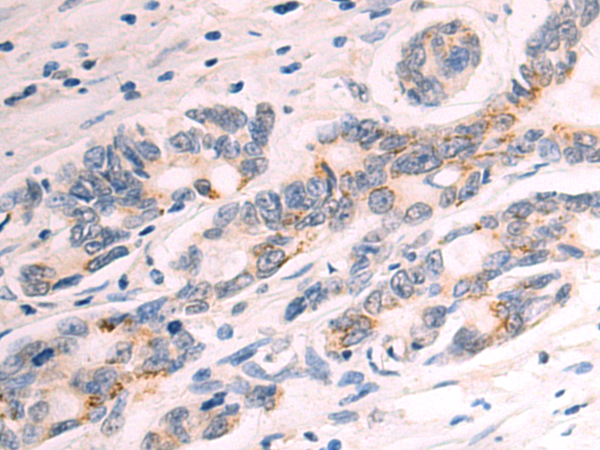

| WB | 咨询技术 | Human,Mouse,Rat |
| IF | 咨询技术 | Human,Mouse,Rat |
| IHC | 1/50-1/100 | Human,Mouse,Rat |
| ICC | 技术咨询 | Human,Mouse,Rat |
| FCM | 咨询技术 | Human,Mouse,Rat |
| Elisa | 1/5000-1/10000 | Human,Mouse,Rat |
| Aliases | GAPD2; GAPDS; HSD-35; GAPDH-2; HEL-S-278 |
| WB Predicted band size | 45 kDa |
| Host/Isotype | Rabbit IgG |
| Antibody Type | Primary antibody |
| Storage | Store at 4°C short term. Aliquot and store at -20°C long term. Avoid freeze/thaw cycles. |
| Species Reactivity | Human |
| Immunogen | Synthetic peptide of human GAPDHS |
| Formulation | Purified antibody in PBS with 0.05% sodium azide and 50% glycerol. |
+ +
以下是关于GAPDHS抗体的3篇参考文献的简要信息:
1. **文献名称**:Glyceraldehyde 3-phosphate dehydrogenase-S, a sperm-specific glycolytic enzyme, is required for sperm motility and male fertility
**作者**:Miki, K. et al.
**摘要**:该研究通过基因敲除小鼠模型,发现GAPDHS缺失导致精子能量代谢障碍和运动能力丧失,最终引发雄性不育。研究中使用GAPDHS抗体验证了蛋白在精子中的特异性表达及敲除后蛋白的缺失。
2. **文献名称**:Mammalian sperm energy metabolism: oxygenation and phosphorylation of glyceraldehyde 3-phosphate dehydrogenase-S (GAPDHS)
**作者**:Nakamura, N. et al.
**摘要**:探讨GAPDHS在精子糖酵解中的调控机制,通过抗体进行免疫荧光定位,发现该酶集中分布于精子尾部线粒体鞘,提示其直接参与鞭毛运动的能量供应。
3. **文献名称**:Cloning and expression of a novel tissue-specific isoform of glyceraldehyde-3-phosphate dehydrogenase from mouse testis
**作者**:Welch, J.E. et al.
**摘要**:首次报道小鼠GAPDHS基因的克隆及睾丸特异性表达,通过制备特异性抗体证实该蛋白仅在精子发生晚期表达,为后续功能研究奠定基础。
*注:如需完整文献信息,建议通过PubMed或Sci-Hub输入标题查询。*
The GAPDHS antibody targets a unique isoform of glyceraldehyde-3-phosphate dehydrogenase (GAPDH), specifically expressed in spermatogenic cells during mammalian spermatogenesis. Unlike the ubiquitously expressed GAPDH involved in glycolysis, GAPDHS (Glyceraldehyde-3-phosphate dehydrogenase, spermatogenic) is testis-specific and plays a critical role in sperm metabolism, motility, and fertilization. Its expression is tightly regulated during spermatogenesis, peaking in late-stage germ cells and mature spermatozoa.
GAPDHS antibodies are essential tools for studying male fertility, testicular function, and sperm development. They enable the detection and localization of GAPDHS protein in testicular tissues or sperm samples using techniques like Western blotting, immunohistochemistry (IHC), and immunofluorescence (IF). Research using these antibodies has highlighted GAPDHS's role in maintaining energy homeostasis in sperm, particularly in the flagellum, where it supports ATP production for motility.
Dysregulation or mutations in GAPDHS are linked to asthenozoospermia (reduced sperm motility) and male infertility, making it a potential biomarker for diagnostic or therapeutic applications. Additionally, GAPDHS antibodies aid in exploring metabolic adaptations in sperm and evaluating environmental or genetic factors affecting reproductive health. Their specificity ensures minimal cross-reactivity with somatic GAPDH, enhancing reliability in reproductive biology studies.
×